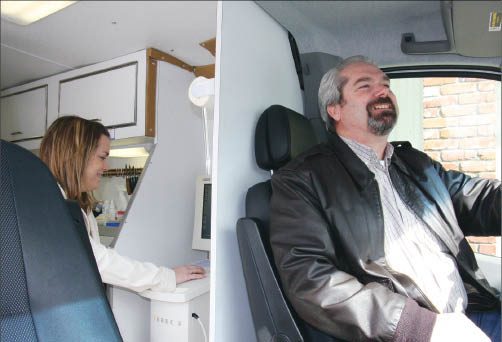
Home » Biting into a mobile niche
Biting into a mobile niche

March 26, 2009
Dental crowns" and "convenience" aren't words that often go together, but Dominic Case is trying to change that.
Case, co-owner of Crown King Dental Restoration Services Inc., at 7826 N. Market, has launched a mobile lab with computer-aided design and manufacturing equipment that creates dental crowns to precise specifications in less than two hours. The other co-owner is Mead resident Kerry Schmidt, an airline pilot who isn't actively involved in the business.
A dental crown is a prosthetic cap or cover used to repair, strengthen, or restore function and appearance of a tooth.
"You might need one if you break a tooth, get a root canal, or have a big cavity," Case says.
Crown King incorporated here in May. Case admits it's been a difficult economic time for the two founders, who have invested more than $150,000, to bite into a new niche, and the company is hungry for clients.
"People aren't doing anything with dentists right now," he says. "Some dentists are cutting back their hours."
Case, though, is betting the convenience factor alone will help the business catch on with dentists and their patients.
He asserts conventional dental labs take two to three weeks to turn around an order for a crown, necessitating at least two visits to the dentist. During the first visit, the dentist prepares a tooth for a crown, makes a plastic cast of the patient's mouth, and installs a temporary crown. The cast and the dentist's instructions are sent to a dental lab, which fabricates the crown. Patients return for the second appointment when the crown is ready.
With Crown King, the prosthesis can be made during one patient visit, thus requiring no temporary crown, Case says.
"This way, a dentist can take advantage with quick turnaround without the cost of (buying) the machine," he says.
Crown King's mobile dental restoration lab is set up in a Dodge 2500 Sprinter, which is a full-sized van designed to be configured for a variety of commercial uses. The van was outfitted by SmartTrucks Inc., of Atlanta, at a total cost of about $55,000, Case says. The self-contained unit is equipped with a 6,500-watt electrical generator that's fueled by a 24-gallon propane tank to power a Cerec 3 computer-aided design and manufacturing system.
The Cerec 3 system costs about $100,000. It's made by Sirona Dental Systems LLC, of Bensheim, Germany, and distributed in the U.S. and Canada by St. Paul Minn.-based Patterson Dental Supply Inc., which has a branch in Spokane Valley.
The lab area is about 10 feet long by 6 feet wide and includes a countertop work area with cabinets above and below it for supply storage.
The lab's height measures just under 6 feet from floor to ceiling, which provides plenty of clearance for April Beville, a senior lab technician and Crown King's only employee so far.
Case says he met Beville through a contact in the dental field who recommended her as a qualified Cerec technician. She's also an experienced dental assistant.
The Cerec 3 system includes a computer station and an automated milling machine that Beville uses to design crowns to custom specifications for each recipient and to make them.
Most of the time, the crowns are manufactured while the van is outside the dentist office.
The dentist provides a plastic impression of the prepared tooth on which the crown would be seated and a mold of teeth surrounding the prepared tooth.
In the mobile lab, Beville coats the bite mold and tooth impression with a reflective powder and records images of them with a handheld scanning wand. The Cerec 3 system converts the images into a virtual 3-D model and sends the computerized model to the milling machine.
That machine, which is about the size of a bread-making appliance, carves a small ceramic cube into the crown. Some crowns—such as those designed for molars—are then hardened in a small oven.
The finished crown is then returned to the dentist, who seats it in the waiting patient's mouth.
For those who don't want all the work done in one visit, Crown King also offers 48-hour and five-day turnaround times, which still allow dentists to speed up their crown-seating cycle compared with the turnaround times offered by conventional dental labs for crowns, Case says.
Crown King's target market includes dentists who don't do enough crowns to justify buying their own crown-making equipment.
"For dentists who do one or two crowns a day, the system doesn't pay for itself," Case says. "Those are the folks who would use us."
He asserts Crown King's prices meet or beat prices charged by conventional dental labs, most of which use a different process to manufacture crowns.
"We're not trying to replace dental labs," he says. "We only do crowns. We don't do dentures and bridges."
Case has a background as a medical service engineer, servicing and repairing magnetic resonance imaging and computed tomography scanners. He and his wife, Cindy, own Environment Control, a commercial building-maintenance franchise here. He was looking to start up another business when he heard of a company in Colorado that provided a mobile dental-restoration service, and he developed a business model for Crown King.
The company's goal is to have a fleet of at least five mobile crown labs in the Spokane area, Case says. Each would be able to serve about 10 dentists and manufacture about eight crowns a day, he says.
Crown King's next vehicle will be a larger van with more inside clearance and enough room for Beville to train technicians on the system, Case says.
Latest News
Related Articles




